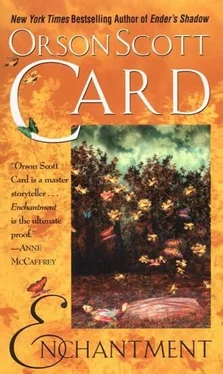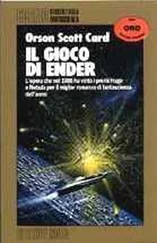Orson Card - Enchantment
Здесь есть возможность читать онлайн «Orson Card - Enchantment» весь текст электронной книги совершенно бесплатно (целиком полную версию без сокращений). В некоторых случаях можно слушать аудио, скачать через торрент в формате fb2 и присутствует краткое содержание. Жанр: Фантастика и фэнтези, на английском языке. Описание произведения, (предисловие) а так же отзывы посетителей доступны на портале библиотеки ЛибКат.
- Название:Enchantment
- Автор:
- Жанр:
- Год:неизвестен
- ISBN:нет данных
- Рейтинг книги:5 / 5. Голосов: 1
-
Избранное:Добавить в избранное
- Отзывы:
-
Ваша оценка:
- 100
- 1
- 2
- 3
- 4
- 5
Enchantment: краткое содержание, описание и аннотация
Предлагаем к чтению аннотацию, описание, краткое содержание или предисловие (зависит от того, что написал сам автор книги «Enchantment»). Если вы не нашли необходимую информацию о книге — напишите в комментариях, мы постараемся отыскать её.
Enchantment — читать онлайн бесплатно полную книгу (весь текст) целиком
Ниже представлен текст книги, разбитый по страницам. Система сохранения места последней прочитанной страницы, позволяет с удобством читать онлайн бесплатно книгу «Enchantment», без необходимости каждый раз заново искать на чём Вы остановились. Поставьте закладку, и сможете в любой момент перейти на страницу, на которой закончили чтение.
Интервал:
Закладка:
So Ivan stopped intruding, taking part in the conversation only when he was needed as an interpreter. He continued to watch, however, and gradually realized that Katerina and Mother had something else in common, something that he had never noticed in all the years he had spent in Mother's kitchen. Mother used magic.
Why hadn't he recognized it in the kitchen just outside King Matfei's house? The tiny bowl of salt and crust of bread near the cookfire—in Taina, he assumed it was an offering to a god that was not officially worshiped in that newly Christian land. But Mother also had these things on the stove. When Ivan was young and asked her why she never used the salt from the tiny bowl, she explained that it was "to take moisture out of the air." Later, Ivan realized that it was an old superstition that Mother had learned from her mother and on back, from time immemorial. Only when he got to Taina did he learn that these old gods were real, and that the salt and bread were not offerings at all, but charms—that is, they weren't there for some god to figuratively eat, but rather because they had been enchanted with power to drive off misfortunes. They were magical in themselves.
So when Katerina, the first time she approached the stove, dried her finger on her skirt and touched the salt and the bread, Ivan realized that this was no obeisance to a long-forgotten god, but rather a way to bring herself within the enchanted protection of the kitchen. And Katerina, who had a sense of these things, did not for a moment act as if the bread and salt might have been improperly magicked up—on the contrary, Katerina acted right at home in Mother's kitchen. No protections needed, because the place was already protected.
Ivan looked around. The string of garlic hanging in the pantry—again, a folk remedy, Ivan had thought, but now remembered the magical properties of garlic in folklore. He could no longer assume that anything was a "mere" superstition, and it occurred to him that keeping rats, roaches, and other vermin out of the pantry by the use of lightly enchanted garlic was certainly healthier than putting a No-Pest Strip in there to leak indiscriminate poison into the air.
Just how enchanted was the house he grew up in? And did Mother know that the rituals she followed really worked?
Of course she knew.
Ivan had grown up knowing his father's work, loving it, learning it, following in his footsteps. But he had been surrounded by another sort of lore entirely, just as ancient—no, more so, for instead of studying ancient things from a modern point of view, Mother actually did the ancient things, keeping alive that long unbroken tradition—and he had remained oblivious to it.
Still, he said nothing about it there in the kitchen. If they didn't discuss it with men—and Mother had certainly never discussed it with Ivan, or Father either, Ivan was quite sure—then there was no reason to plague them with questions they wouldn't answer.
Though back in Taina, men were not kept in ignorance of magic. In Taina, they knew perfectly well what the women were doing, and they did their own magic, what with the enchantments of the swordsmith at the forge and the farmer at the plow, the mushroom-gatherer and the hunter in the forest. So it wasn't men per se, it was rational men, men of science and scholarship, men like Father. And like me.
Father was grumpy—no, downright surly—when he came downstairs for supper. Uncharacteristically, he said little during the beginning of the meal, though his eyes burned a little when Katerina crossed herself and muttered a short Christian prayer before setting fork to food. Ivan tried to ignore his father's ill temper, preferring to watch the way Katerina learned the customs of the table, different here from Cousin Marek's. From the imperious traveler she had been upon crossing the bridge, contemptuous of strange customs, Katerina had in a few days changed herself amazingly, becoming downright adaptable, perhaps even welcoming of change. She fumbled now and then, but with a charming manner, and when Ivan did notice his father it was because his father was noticing Katerina and giving her grudging respect.
Or was that it? For after the meal, when Katerina and Mother were clearing away—Ivan would have helped, but both women insisted that this time he let them work together—Father leaned back in his chair and, a cynical little smile at his lips, said, "She certainly is picking up modern customs quickly, isn't she?"
The implication was clear—that Katerina was only pretending not to be a modern woman.
"How stupid do you think people of the ninth century were, and how difficult and complicated do you think our customs are?" asked Ivan.
"Don't get sarcastic with me," said Father. "You're asking me to believe in a pretty far-fetched story, when Occam's razor demands a much simpler explanation."
"Believe me, Father, if there were a simpler explanation, Occam and I would both be happy."
"You believe what you want to believe," said Father. "I must believe the evidence."
Ivan could hardly believe what he was hearing. Switching into English—his natural language for savage intellectual argument—he leaned in and said, "How often in my life have you known me to get sucked into some confidence game? Have I claimed to see UFOs? Did I join the Communist Party? Where exactly did I earn this reputation as an unskeptical believer of whatever bullshit comes down the pike? And you, Father, when did you become the supreme rationalist, the impartial judge of evidence you haven't even seen? It seems to me that I'm the eyewitness, and you're the one making judgments based solely on your pre-existing faith."
"Faith in a rational universe, yes."
"No, Father. You don't have faith in a rational universe. This is a universe where nothing can move faster than the utterly arbitrary speed of 186,000 miles per second, where feathers and rocks fall at the same speed in a vacuum, where a measurable but unexplainable force called gravity binds people to planets and planets to stars, and where a butterfly's wing in China might cause a hurricane in the Caribbean. But you have faith in all this incomprehensible mumbo-jumbo which you don't begin to understand, solely because the priests of the established church of the intellectuals have declared these to be immutable laws and you, being a faithful supplicant at their altar, don't even think to question them."
"You sound like a convert to a new religion yourself," said Father dryly.
"Maybe I am. Or maybe I'm the guy who crawled out of the cave, and you're still back inside it, trying to understand the universe by studying shadows on the wall. Well, Father, I've seen things that can only be explained by magic. Now, I guess I'm really still a closet materialist, because I believe these things all have rational explanations, using principles of nature that are not yet known to us. But what I can't do is close my eyes and pretend that the things that have happened to me will go away if I just say 'Einstein' five times fast."
"I was invoking Occam, you'll remember," said Father.
That was enough of a touch of humor to defuse the situation a little. "Look, Father, I can't argue with you, I can't persuade you, because you weren't there. All I can tell you is this: No language can survive without a community of speakers. As you said yourself, the proto-Slavonic that Katerina speaks is far too pure and ancient to come from an isolated pocket in the mountains somewhere. Occam's razor demands only one answer: She actually is from the ninth century."
"No, Vanya, it demands a completely different one—she's an Eliza Doolittle. She's been trained to speak proto-Slavonic, fluently."
"No!" Ivan slapped the table in frustration. "Listen to yourself! Listen to her. You of all people know that language is the one thing that can't be faked. She knows too many words that we don't know. She has an accent that neither of us could have guessed at—the vowels are shaped right, but not exactly as predicted, and the nasals are already fading sooner than we thought. A modern scholar would have taught her using the assumptions of modern scholarship. The nasals would be pure. The palatals more pronounced."
Читать дальшеИнтервал:
Закладка:
Похожие книги на «Enchantment»
Представляем Вашему вниманию похожие книги на «Enchantment» списком для выбора. Мы отобрали схожую по названию и смыслу литературу в надежде предоставить читателям больше вариантов отыскать новые, интересные, ещё непрочитанные произведения.
Обсуждение, отзывы о книге «Enchantment» и просто собственные мнения читателей. Оставьте ваши комментарии, напишите, что Вы думаете о произведении, его смысле или главных героях. Укажите что конкретно понравилось, а что нет, и почему Вы так считаете.










